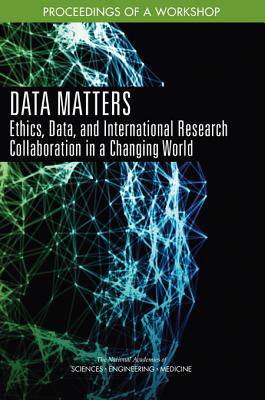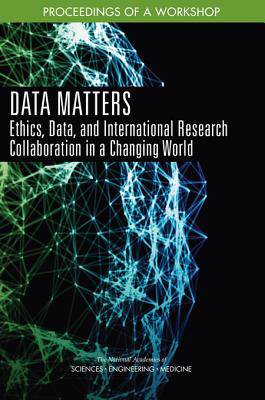
- Retrait gratuit dans votre magasin Club
- 7.000.000 titres dans notre catalogue
- Payer en toute sécurité
- Toujours un magasin près de chez vous
- Retrait gratuit dans votre magasin Club
- 7.000.0000 titres dans notre catalogue
- Payer en toute sécurité
- Toujours un magasin près de chez vous
Data Matters
Ethics, Data, and International Research Collaboration in a Changing World: Proceedings of a Workshop
National Academies of Sciences Engineering and Medicine, Policy and Global Affairs, Government-University-Industry Research Roundtable, Planning Committee for the Workshop on Ethics Data and InternatiDescription
In an increasingly interconnected world, perhaps it should come as no surprise that international collaboration in science and technology research is growing at a remarkable rate. As science and technology capabilities grow around the world, U.S.-based organizations are finding that international collaborations and partnerships provide unique opportunities to enhance research and training.
International research agreements can serve many purposes, but data are always involved in these collaborations. The kinds of data in play within international research agreements varies widely and may range from financial and consumer data, to Earth and space data, to population behavior and health data, to specific project-generated data--this is just a narrow set of examples of research data but illustrates the breadth of possibilities. The uses of these data are various and require accounting for the effects of data access, use, and sharing on many different parties. Cultural, legal, policy, and technical concerns are also important determinants of what can be done in the realms of maintaining privacy, confidentiality, and security, and ethics is a lens through which the issues of data, data sharing, and research agreements can be viewed as well.
A workshop held on March 14-16, 2018, in Washington, DC explored the changing opportunities and risks of data management and use across disciplinary domains. The third workshop in a series, participants gathered to examine advisory principles for consideration when developing international research agreements, in the pursuit of highlighting promising practices for sustaining and enabling international research collaborations at the highest ethical level possible. The intent of the workshop was to explore, through an ethical lens, the changing opportunities and risks associated with data management and use across disciplinary domains--all within the context of international research agreements. This publication summarizes the presentations and discussions from the workshop.
Spécifications
Parties prenantes
- Auteur(s) :
- Editeur:
Contenu
- Nombre de pages :
- 102
- Langue:
- Anglais
Caractéristiques
- EAN:
- 9780309482479
- Date de parution :
- 28-01-19
- Format:
- Livre broché
- Format numérique:
- Trade paperback (VS)
- Dimensions :
- 152 mm x 229 mm

Les avis
Nous publions uniquement les avis qui respectent les conditions requises. Consultez nos conditions pour les avis.






